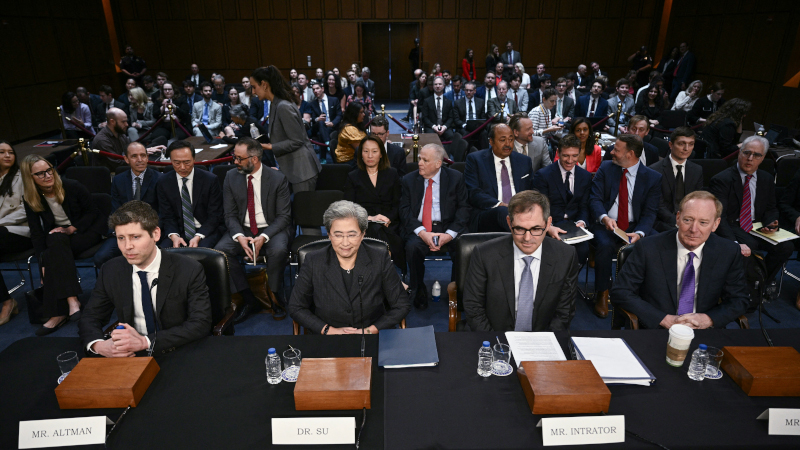 Image Credit: BRENDAN SMIALOWSKI/AFP via Getty Images
Image Credit: BRENDAN SMIALOWSKI/AFP via Getty Images The U.S. Senate crushed a sneaky plan by Rep. Jay Obernolte (R-CA) to block states from regulating artificial intelligence (AI) for a decade.
The plan, part of the “One Big Beautiful Bill Act” (H.R. 1), was meant to stop states from making their own AI laws, but it was shot down in a 99-1 vote on July 1. Critics say it was a Big Tech scheme to avoid accountability, and it raised big questions about whether it violated the Constitution’s Tenth Amendment.
Obernolte, a tech guy who co-chairs the House’s AI Task Force, pushed the 10-year moratorium to keep AI rules under federal control. He claimed it would help America stay ahead of China.
“An extensive collection of state laws is the fastest way to secure Chinese dominance of AI,” Obernolte said, per PolitiFact.
His plan was backed by tech billionaires like Sam Altman, Palmer Luckey, Marc Andreesen, Ben Horowitz, and Senator Ted Cruz (R-TX), according to TechCrunch.
But the moratorium got slammed by folks on both sides.
Sen. Marsha Blackburn (R-TN) led the charge to kill it, saying it would hurt states’ ability to protect people.
“We cannot prohibit states from protecting Americans, including the vibrant creative community in Tennessee, from the harms of AI,” Blackburn told TIME.
She worried it would block laws like Tennessee’s ELVIS Act, which stops AI from stealing artists’ voices or faces.
Even some Republicans, like Rep. Marjorie Taylor Greene, hated the idea.
“I am adamantly OPPOSED to this and it is a violation of state rights and I would have voted NO if I had known this was in there,” Greene posted on X. She didn’t even know the moratorium was in the bill when she voted for it in the House on May 22, 2025.
The Tenth Amendment says powers not given to the federal government belong to the states or the people. Critics argued Obernolte’s plan was unconstitutional because it took away states’ rights to protect their citizens from AI dangers like deepfakes or job-killing algorithms.
A letter from 260 state lawmakers from all 50 states called it “sweeping and wholly destructive,” according to the Washington Post.
They said states need to act fast on AI issues, especially since Congress hasn’t passed any big AI laws yet.
Sen. Maria Cantwell (D-WA) teamed up with Blackburn to wipe out the moratorium.
“It’s just another giveaway to tech companies,” Cantwell said.
They worried it would let companies like OpenAI build an “AI surveillance grid” to track and control people without state oversight.
Obernolte claimed his plan was just a temporary fix until Congress could make a federal AI framework.
“I strongly support states’ rights, but when it comes to technologies that cross state lines, it’s Congress’s responsibility to lead with thoughtful, uniform policy,” he told TIME.
But many saw it as a Big Tech power grab for Sam Altman who’s already been under intense scrutiny.
Altman, who is CEO of OpenAI, has faced heavy criticism for his Worldcoin project, which scans people’s irises to create a digital ID in exchange for cryptocurrency.
Privacy experts and regulators, like those in Kenya and Hong Kong, slammed it as a dystopian scheme that risks exploiting biometric data, with reports of black markets trading iris scans for as little as $30 in places like Cambodia.
Critics argue Altman’s push for “proof of personhood” fuels a surveillance grid, especially since he’s driving AI advancements that blur human-bot distinctions.
Elon Musk co-founded OpenAI but left in 2018, calling Altman “Scam Altman,” accusing him of lying about OpenAI’s nonprofit mission and prioritizing profits over ethics.
Musk’s attacks, including a $97.4 billion bid to buy OpenAI’s nonprofit arm, highlight their feud, with Musk alleging Altman’s Worldcoin and OpenAI ventures are scams that could lead to unchecked AI control.
InfoWars’ Alex Jones has long warned about AI’s dangers.
“They’re building a global AI control grid to enslave humanity, and they don’t want states stopping it!” Jones said on his show last year.
His words ring true as Obernolte’s plan would have let tech giants run wild while states were stuck waiting for federal rules.
Altman’s White House visits and attacks from Elon Musk suddenly make more sense.
Bilderberg attendee and billionaire founder of the “PayPal Mafia” Peter Theil recently said the threat of One World Government is greater than AI or climate change.
The Senate’s vote was a win for states’ rights and a blow to Big Tech’s dreams of an unchecked AI takeover, but Altman’s proximity to the AI moratorium and his track record lingers over the debate.
The fight over who controls this tech is far from over.


